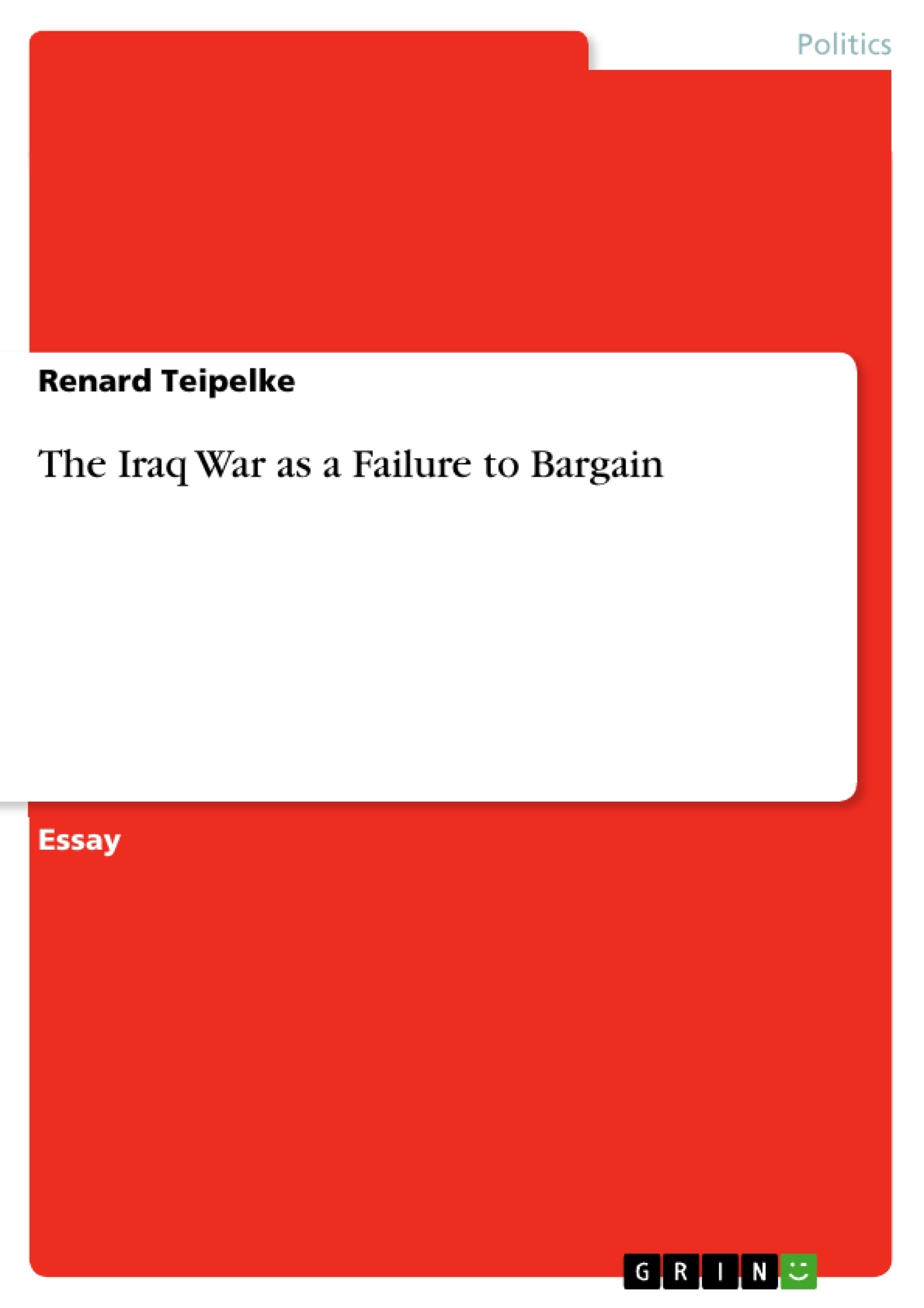Bargaining can be described as a zero-sum game: when two players interact with each other, the outcome of a bargaining will make one of these two players better off at the expense of the other. In the following essay, I will demonstrate why the Iraq war in 2003 was a failure to bargain. Using the approach of the World Politics book by Frieden, Lake, and Schultz (2010), I will analyze interests, interactions, and institutions with regard to this bargaining failure between the United States and Iraq.
Inhaltsverzeichnis (Table of Contents)
- Introduction
- Interests
- Interactions
- Institutions
- The United Nations
- Alliances
- Conclusion
Zielsetzung und Themenschwerpunkte (Objectives and Key Themes)
This essay analyzes the Iraq War in 2003 as a failure to bargain between the United States and Iraq. It aims to demonstrate why the conflict escalated despite the potential for a peaceful resolution. Using the framework of interests, interactions, and institutions, the author explores the factors that contributed to the breakdown of negotiations.
- The divergent interests of the United States and Iraq regarding national security and domestic stability.
- The role of credibility problems and incomplete information in undermining effective interactions between the two countries.
- The limitations of institutions, such as the United Nations and alliances, in facilitating a negotiated settlement.
- The impact of hawkish domestic interests in the United States on the bargaining process.
- The importance of considering the interplay of interests, interactions, and institutions in understanding the failure to bargain.
Zusammenfassung der Kapitel (Chapter Summaries)
- Introduction: This section defines bargaining as a zero-sum game and introduces the essay's central argument that the Iraq War resulted from a failure to bargain. The author outlines the analytical framework of interests, interactions, and institutions, which will be applied throughout the essay.
- Interests: This chapter examines the interests of both the United States and Iraq, focusing on their national security and domestic considerations. The United States, motivated by concerns about WMD proliferation and regional instability, saw the removal of Saddam Hussein as a crucial security objective. Iraq, under Saddam Hussein's leadership, sought to maintain its power and authority, fearing both internal rebellion and the threat from Iran. The chapter highlights the conflicting interests and their implications for bargaining.
- Interactions: This chapter discusses the problematic interactions between the United States and Iraq, particularly the lack of trust and the presence of incomplete information. The author argues that the Iraqi regime's failure to make credible commitments regarding its WMD program and the United States' inability to fully assess Iraq's true capabilities exacerbated tensions and undermined the possibility of a peaceful resolution.
- Institutions: This chapter explores the role of international institutions in the conflict. The author examines the limitations of the United Nations as a collective security organization, citing the failure of weapons inspections and the inability of the Security Council to reach a consensus on military action against Iraq. The chapter also discusses the United States' reliance on a "coalition of the willing" to support its military intervention, highlighting the impact of alliances on the bargaining process.
Schlüsselwörter (Keywords)
This essay focuses on the Iraq War, bargaining failure, interests, interactions, institutions, national security, WMD, Saddam Hussein, United Nations, alliances, and the "coalition of the willing." It analyzes the factors that contributed to the conflict's escalation, particularly the interplay of competing interests, credibility issues, and the limitations of international institutions in facilitating a negotiated settlement.
Frequently Asked Questions
Why is the Iraq War considered a "failure to bargain"?
The essay argues that despite the potential for a peaceful resolution, conflicting interests and communication breakdowns led to war instead of a deal.
What role did "Incomplete Information" play in the conflict?
Neither side could fully assess the other's true capabilities or resolve, particularly regarding Iraq's alleged Weapons of Mass Destruction (WMD).
How did domestic interests in the US influence the war?
The presence of "hawkish" domestic interests pushed for a military solution, making a negotiated settlement less likely.
What was the role of the United Nations in this bargaining failure?
The UN failed as a collective security organization because it couldn't reach a consensus or ensure credible inspections that satisfied all parties.
What is a "zero-sum game" in bargaining?
It is a situation where one player's gain is exactly balanced by the other player's loss, often leading to intense conflict in high-stakes politics.
- Citation du texte
- Renard Teipelke (Auteur), 2010, The Iraq War as a Failure to Bargain, Munich, GRIN Verlag, https://www.grin.com/document/153499



